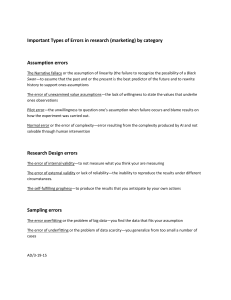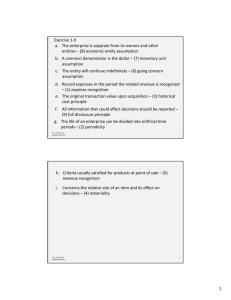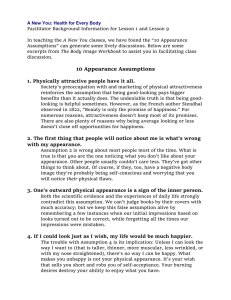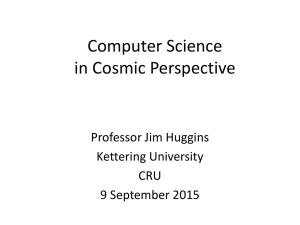10 Appearance Assumptions
advertisement
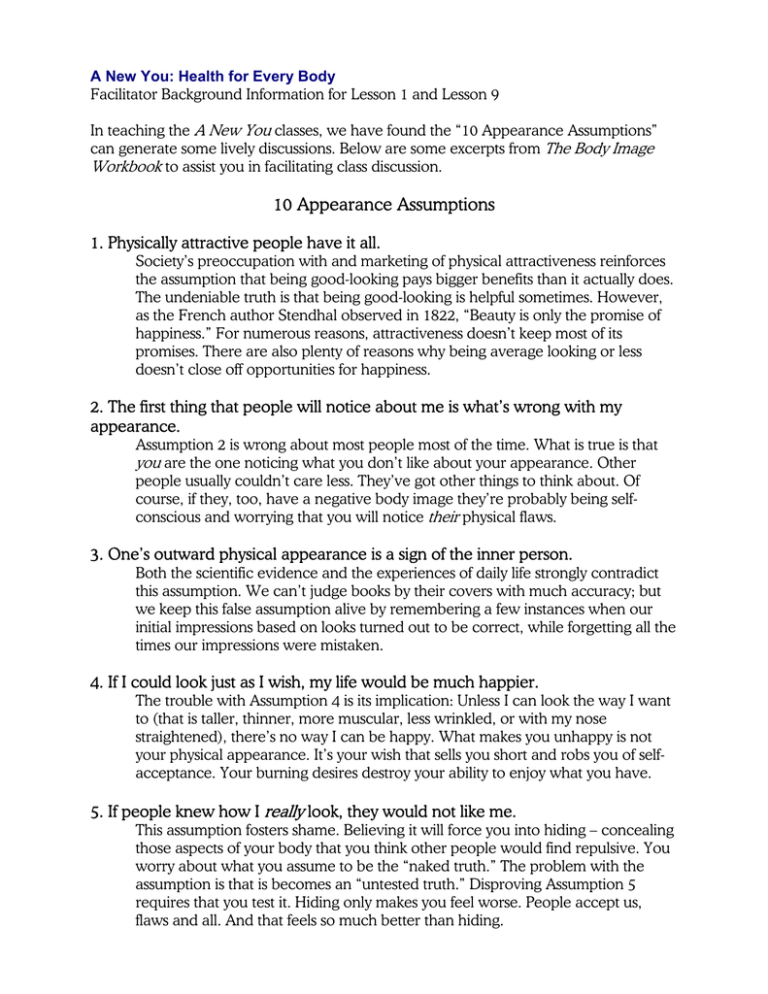
A New You: Health for Every Body Facilitator Background Information for Lesson 1 and Lesson 9 In teaching the A New You classes, we have found the “10 Appearance Assumptions” can generate some lively discussions. Below are some excerpts from The Body Image Workbook to assist you in facilitating class discussion. 10 Appearance Assumptions 1. Physically attractive people have it all. Society’s preoccupation with and marketing of physical attractiveness reinforces the assumption that being good-looking pays bigger benefits than it actually does. The undeniable truth is that being good-looking is helpful sometimes. However, as the French author Stendhal observed in 1822, “Beauty is only the promise of happiness.” For numerous reasons, attractiveness doesn’t keep most of its promises. There are also plenty of reasons why being average looking or less doesn’t close off opportunities for happiness. 2. The first thing that people will notice about me is what’s wrong with my appearance. Assumption 2 is wrong about most people most of the time. What is true is that you are the one noticing what you don’t like about your appearance. Other people usually couldn’t care less. They’ve got other things to think about. Of course, if they, too, have a negative body image they’re probably being selfconscious and worrying that you will notice their physical flaws. 3. One’s outward physical appearance is a sign of the inner person. Both the scientific evidence and the experiences of daily life strongly contradict this assumption. We can’t judge books by their covers with much accuracy; but we keep this false assumption alive by remembering a few instances when our initial impressions based on looks turned out to be correct, while forgetting all the times our impressions were mistaken. 4. If I could look just as I wish, my life would be much happier. The trouble with Assumption 4 is its implication: Unless I can look the way I want to (that is taller, thinner, more muscular, less wrinkled, or with my nose straightened), there’s no way I can be happy. What makes you unhappy is not your physical appearance. It’s your wish that sells you short and robs you of selfacceptance. Your burning desires destroy your ability to enjoy what you have. 5. If people knew how I really look, they would not like me. This assumption fosters shame. Believing it will force you into hiding – concealing those aspects of your body that you think other people would find repulsive. You worry about what you assume to be the “naked truth.” The problem with the assumption is that is becomes an “untested truth.” Disproving Assumption 5 requires that you test it. Hiding only makes you feel worse. People accept us, flaws and all. And that feels so much better than hiding. 6. By controlling my appearance, I can control my social and emotional life. You have tremendous control over your looks. Think about all the available tools for managing your appearance – clothing, cosmetics, hairstyling, a healthy diet, and regular exercise. Proper grooming can certainly enhance your looks and make you feel attractive. The hazard, however, comes from relying excessively on these tools. As writer Northrop Frye noted, “The pursuit of beauty is much more dangerous nonsense than the pursuit of truth or goodness, because it affords a stronger temptation to the ego” (1957). 7. My appearance is responsible for much of what has happened to me in my life. Yes, your appearance has affected some things in your life. There may have been times that it paid off and times it was a detriment. Nevertheless, most things that have happened in your life had absolutely nothing to do with your looks. Most were either the product of your personality, intelligence, decisions, and actions, or were simply the result of chance. 8. I should always do whatever I can to look my best. The words “should” and “always” imply that looking your best is a duty. The statement also suggests that by not looking your best you have failed. It’s nice to feel that you look nice; it’s not nice to feel that you always have to. Ask yourself the following: Do you require other people to have the best imaginable appearance at all times? Would you be so harshly judgmental if a friend wore less than perfectly flattering clothing, had a hair out of place, or got a zit? So why should you demand this of yourself? 9. Media messages make it difficult for me to be satisfied with my appearance. With this assumption, you make yourself into a victim. Poor me! So you come to feel powerless. Then what’s the use in trying to change your negative body image? Okay, it’s true that the media convey strong and unhelpful images about physical appearance. They try to convince you there are only two ways that you can be happy and succeed in life. You either must be born with good looks or you must buy all the products and services needed to manufacture physical perfection. 10. The only way I could ever like my looks would be to change them. This is one self-defeating assumption! It drives people to try just about anything to alter their appearance. The basis and power of this assumption is – if something is broken, fix it. But, what is really broken? What’s not working here is your body image, and that’s what needs fixing. Here’s the corrected version of Assumption 10: “The only way I could ever like my looks would be to change my body image.” Source: Cash, Thomas. The Body Image Workbook: An 8-Step Program for Learning to Like Your Looks. California: New Harbinger Publications, 1997.
